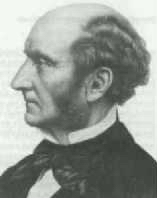 Ideas
Ideas
– All knowledge is derived originally from sense perception.
– Matter, or the external world, can be defined as the permanent possibility of sensation.
– Mind is reducible to successive conscious states.
– True inference is always accomplished through induction rather than deduction.
– Pleasure alone is intrinsically good and pain alone is intrinsically good and pain alone is intrinsically bad.
– Pleasures differ from each other qualitatively as well as quantitatively, a ‘higher’ pleasure being intrinsically better than a ‘lower’ pleasure.
– The only justification society has in interfering with the liberty of action of any individual is self-protection.
– Given the existence of evil, God cannot be both omnipotent and morally good; if he exists, he must be limited in power.
Biography
The particulars of Mill’s life are too well known.
He is the son of the Ricardian economist James Mill, trained from an early age to be a genius, ‘lent’ by his father to utilitarian philosopher Jeremy Bentham, became a utilitarian himself.
He followed his father into the British East India Company. He broke with Bentham. Then he had an existentialist crisis, and turned to the doctrines of Saint-Simon and Comte.
He met Harriet Taylor and waited twenty years for her husband to die.
He became a Whig politician.
John Stuart Mill was an economist, a Classical economist whose magnificent 1848 restatement of Ricardo’s theory was thought to be so conclusive that, in the beginning of a discussion on price theory, he confidently notes that:
“Happily, there is nothing in the laws of Value which remains for the present or any future writer to clear up; the theory of the subject is complete: the only difficulty to be overcome is that of so stating it as to solve by anticipation the chief perplexities which occur in applying it.” (J.S. Mill, Principles, 1848: Book III, Ch. 1).
Major Works of John Stuart Mill
– A system of Logic (1843)
– Principles of Political Economy (1848)
– On Liberty (1859)
– Utilitarian (1863)
– An Examination of Sir William Hamilton’s Philosophy (1865)
– Three Essays on Religion (1874)

 Ideas
Ideas
I am not rattling great with English but I line up this rattling easygoing to interpret.
Just wanna tell that this is handy, Thanks for taking your time to write this.
Everything is very open with a precise explanation of the challenges. It was truly informative. Your site is very helpful. Many thanks for sharing!
I like it when individuals get together and share thoughts. Great blog, keep it up!